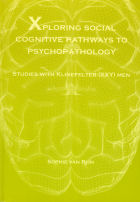
Xploring social cognitive pathways to psychopathology: Studies with Klinefelter (XXY) men / Sophie van Rijn - [S.l.] : [s.n.], 2007 - Doctoral thesis Utrecht University

 |
Xploring social cognitive pathways to psychopathology: Studies with Klinefelter (XXY) men Xploring social cognitive pathways to psychopathology: Studies with Klinefelter (XXY) men / Sophie van Rijn - [S.l.] : [s.n.], 2007 - Doctoral thesis Utrecht University |
De novo occurring genetic variations provide an opportunity the study the effects of genes on brain development and behavior. In this regard, Klinefelter syndrome, characterized by a XXY chromosomal pattern, is of significant interest. Although intelligence in XXY men is within the normal range, specific effects on brain structure, cognition and behavior have been observed. The most prominent behavioral problems are found in the domain of social adaptation. In a series of experiments we have investigated social cognitive capacities dealing with language, emotion an social insight in XXY men. We used neuropsychological tasks as well as functional Magentic Resonance Imaging (MRI) to explore social cognitive impairments and underlying brain abnormalities, that may explain the difficulties in social interaction in these men. As disabilites in social cognition and -behavior are characteristic of autism spectrum- as well as schizophrenia spectrum disorders, we also examined whether XXY men display increased levels of autism- or schizophrenia spectrum pathology. We observed deficits in various domains of social cognition in XXY men, which may contribute to the difficulties in social interactions that have been described for these men. Domains of social cognition that were affected in Klinefelter syndrome were processing affective facial expressions, decoding affective tone of voice, emotion regulation and automatic processing of basic social cues (such as gaze direction and implied biological motion). With regard to the underlying neurobiology, abnormal functioning of the amygdala in XXY men was found using functional MRI. This brain region plays a central role in socio-emotional processing. Reduced lateralization of brain activation during language processing was also observed, which was related to disorganization of thought and language. Measures of psychopathology indicated increased levels of both autistic traits as well as schizotypal traits and schizophrenia symptoms in XXY men. Our findings indicate profound social cognitive deficits, underlying functional brain abnormalities, and increased autism- and schizophrenia-related psychopathology in XXY men. The extra X chromosome in Klinefelter syndrome may play a role in abnormal development of some of the brain mechanisms involved in language, emotion and social behavior, which are considered core domains of disabilities in autism and schizophrenia. Although speculative, studying X-linked genetic mechanisms in Klinefelter syndrome might help us understand pathways from genes to psychopathology in the autism- and schizophrenia spectrum. keywords: XXY, Klimefelter syndrome, autism, schizophrenia, language, emotion, social cognition, fMRI |
Part I: Social behavior and psychopathology
Part II: Social cognition
Part III: Neural basis of social cognition